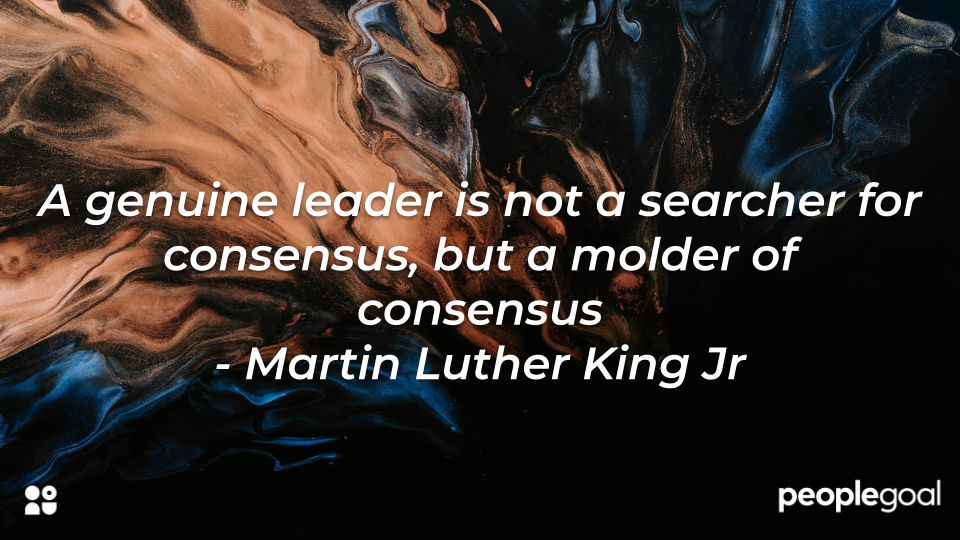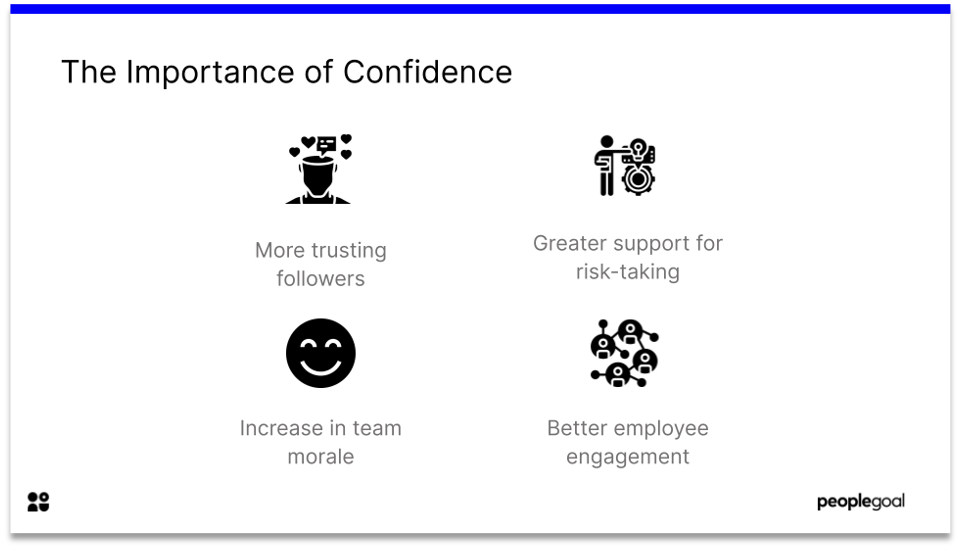It is deeply embedded within the human psyche to seek leadership. In pursuit of guidance and support, individuals look to their friends, colleagues and bosses to provide answers to their questions. Historically, there have been some key figures that stand out as great leaders. From diplomats to tyrannical warmongers, there is an array of people who we regard as having notable leadership traits.
So whilst we can find leadership attributes from those immediately around us, why are some individuals more readily attributed as having the qualities of a leader than others? What makes true leaders?
Through analyzing what it means to be a leader and its significance for influencing others, this article set out to determine the most important qualities of a good leader. There are many great leadership styles and as such, we will also review the contrasting approaches to leadership roles. Having considered a range of different leadership styles, the core leadership attributes that are displayed throughout will inform our ultimate list of the fundamental qualities of a good leader.
Understanding Leadership
In determining, just what exactly we mean when talking about leadership we look to Kevin Kruse who wrote for Forbes:
Leadership is a process of social influence, which maximises the efforts of others, towards the achievement of a goal.
This definition neatly summarizes the concept of leadership. In having the capacity to affect others in an effort to achieve a particular end, a leader will facilitate the attainment of objectives. Whether these goals are aspiring to a big picture objective or simply an individual triumph, great leaders are able to provide guidance for an array of eventualities.

An effective leader is able to present team members with the opportunity to realize their own solution. There is a stark contrast with management. A manager will instruct an individual as to how they should complete a task, whereas, leaders possess an ability to influence without instructing. Of the many important qualities of a good leader, emotional intelligence is one of the core leadership traits.
Leadership Skills
Leaders that possess strong emotional intelligence are able to use this ability to understand and manage their own emotions in order to communicate effectively and empathize with others. An empathetic leader is an empowered and effective leader. When a leader recognizes and appreciates the perspective of their team members, they will be able to more readily collaborate and delegate responsibilities across the team.
Strong leadership can be manifested in a variety of forms. The traits of an individual themselves will determine how they approach team members. Evidently, leadership styles can vary significantly and so it an effective leader must be able to harness their personal traits to get the most out of those around them.

Appreciating a sense of responsibility to inform and guide team members is an important leadership quality. Even if a manager lacks in terms of creativity and innovation, as long as they are able to recognize this and delegate the most fitting roles to the strongest candidates they can ensure that their desired outcomes will be met.
Great leaders are able to understand that they rely on the varying strengths of their team members. This is an important leadership quality as it is all too easy to allocate roles based on favoritism. In reality, adopting this approach in decision-making is an ineffective and counterproductive form of leadership.

When all those in a team feel understood by a leader, they are inspired to perform better. True leaders are considerate of their team’s requirements which encourages stronger feelings of trust and loyalty. A team that is trusting and loyal will be far more productive and committed to fulfilling their responsibilities.
Significance of Leadership
Why do we have leaders?
Leaders help us to identify, understand and verify our purpose. As humans, we are constantly looking for reassurance and confirmation for any of our actions. Our natural desire to be led is linked to Maslow’s Hierarchy of Needs, Jonathan Sandling explains how the human desire for security, purpose and achievement are all related to our dependence on leaders.
Strong leadership has the potential to empower team members with a belief in themselves. It encourages a greater sense of security, purpose and achievement as true leaders create opportunities for individuals to take ownership and feel proud of their contributions.

Since the very first historical recordings of Herodotus and the four Persian Kings, we see how different leadership styles can develop as a result of the character of each individual. With strong leadership, a king is capable of rallying his citizens to support the state. Great leaders have the power to unify groups to collaborate and achieve shared objectives.
Are Leaders necessary?
In the absence of leadership, individuals are left without a standard to follow. The integrity of a team relies on a standard or structure to aim for. Consequently, the qualities of a leader are sincerely missed when no one can take charge and guide the collective. Leaders inspire, they take on the sense of responsibility and affect change or action.
Leadership skills can be distributed across a group of individuals, hence, these individuals are still in essence taking the lead. Whilst the common perception of leadership implies that one person must take charge, this sense of responsibility can be dispersed across a number of people. Oftentimes, strong leadership is manifested in a collective surge of inspired team members.

Leaders are necessary, they give purpose to actions and they unite individuals to collaborate in the pursuit of cooperative aspirations. The ability to envisage the big picture and motivate others to achieve it are important qualities of a good leader. Great leadership is essentially an ability to galvanize activity.
Qualities of a Leader
In this following section, we will discuss the 5 key leadership attributes that encapsulate the true qualities of a leader. For each of these leadership skills, we have also provided the context in which they particularly stand out and have the most significant effect on others. These attributes are listed in no particular order. With so much variance in leadership styles, some attributes may resonate with you more than others.
These 5 key leadership attributes include:
- Vision
- Confidence
- Integrity
- Empathy
- Gratitude
Vision
A company’s vision will only stretch as far as a leader’s influence over the team. Having vision is an important leadership quality as it presents a clear direction for team members. Moreover, with a clear, exciting concept for where the company is headed – there is a greater potential for engaging employees. Great leaders are capable of inspiring an emotional investment from their employees.
Vision is the art of seeing what is invisible to others
- Jonathan Swift
When all team members truly believe in what they are working towards, there is a greater potential for reaching, and even surpassing long-term goals. Vision represents a strong leadership trait for its capacity to communicate and rally team members. A leader with vision will have the necessary support to achieve whatever they set out to do.
Confidence
Effective leadership is exhibited by confident individuals. It is impossible to convince others to support your vision unless you demonstrate complete self-confidence. Regardless of the anxieties or uncomfortable interactions that a leader may be faced with, true leaders are able to hold their nerve and remain confident in any situation.
Qualities of a leader are displayed when, even in the face of adversity, one is able to work through problems to determine a robust solution. Through presenting one’s ability to maintain a strong leadership role in any circumstance will prompt the backing of others.

Integrity
Being able to maintain a consistent and level approach as a leader is vital to assembling followers. A leader that lacks integrity can not be a leader at all. Integrity is the backbone that holds the qualities of a good leader. At the core of integrity is truthfulness, when a leader is able to own their faults and their shortcomings, this illustrates to others that they are true to their word.
Integrity is telling myself the truth. And honesty is telling the truth to other people
- Spencer Johnson
Leaders that can convey their integrity will inspire others to be more trusting of them. The key to any leader’s success is the ability to sustain a trusting and loyal group of followers. This may be attained through taking ownership of their mistakes or through praising the contributions of others without promoting their own involvement. Any way that a leader can demonstrate their commitment to the team is reflected as a strong leadership trait.
Empathy
An effective leader is able to understand and empathize with their team members. Often recognized as an affinity for emotional intelligence, great leaders must be able to develop a deeper personal connection with each of their followers. This goes beyond immediate amicable social interactions and refers to the ability to emotionally support employees through any personal difficulties.
Throughout the various leadership styles, the qualities of a leader are measured against their ability to establish genuine relationships with team members.

An empathetic leader will not only recognize when an employee needs help, but they will also understand how to act in order to support them. This important leadership quality is seen with the sense of responsibility a true leader takes on, going beyond what is required to achieve their organizational objectives and proactively working to help team members in any way they can.
Gratitude
Turning to our fifth and final leadership attribute, gratitude is the capacity to give thanks for the contribution of others. Great leaders will put their team members before themselves. Giving praise for the contributions of your team will significantly boost self-esteem and increase productivity. When an individual receives gratification for their efforts, it will motivate better performance.
The qualities of a leader can be measured through a comfortability in putting praise upon others before oneself. Strong leadership is seen in exactly this ability to act unselfishly and celebrate the accomplishments of followers.

Resisting the temptation to take ownership of the company’s success so that others receive the recognition they deserve is an admirable leadership trait. Moreover, great leadership is measured precisely on a leader’s willingness to promote the performance of the team as a whole.
Leaders that possess the leadership attribute of gratitude will be able to sustain far more success long-term, as all involved share a mutual sense of purpose and achievement.
All in all, the qualities of a leader are embedded in a number of behaviors. The role of a leader is essential in any group, an individual or group that can inspire and motivate others to aspire to fulfill a common goal is a fundamental aspect of social interaction. For any leader that has read through this article and found that their own approach is heavily misaligned, you could consider recruiting a leadership coach to enhance your own leadership qualities.
Of course, there is no one-size-fits-all leadership style, however, the traits and approaches discussed in this article outline the fundamental leadership attributes that have been proven to facilitate the success of great leaders and teams alike.
Ready to 3x Your Teams' Performance?
Use the best performance management software to align goals, track progress, and boost employee engagement.






